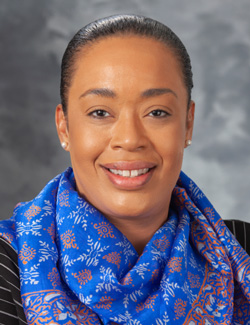
Hope Broadus
Associate Dean of Human Resources
School of Medicine and Public Health (SMPH)
How did you come to work in the field of human resources, and at UW?
After law school, I worked for a small litigation firm in Cincinnati, OH. My practice was focused on employment, professional liability defense, and ethics. After five years in private practice, I moved on to an in-house counsel role with the United States Department of Defense, Defense Logistics Agency (DLA) in California focusing on employment and labor law.
It was with DLA that I worked with some really great HR people, and I started thinking about what I wanted to do next. I thought I could be more effective in the employment and labor relations arena if I was closer to the front lines. As an attorney, many times I was helping with a case much farther along, when decisions and wrong turns had already been made by the parties involved. I liked the idea of getting out in front of issues and helping supervisors and employees find solutions to everyday issues through advising, workplace interventions, and developing needed skills with training. HR professionals engaged regularly in that kind of work—and I wanted to be a part of it.
It took a bit of convincing folks I could do HR. I broke into HR with the San Francisco Public Utilities Commission (SFPUC) focusing on employee and labor relations and equal employment opportunity programs. It was a very hands-on, forward-facing role. At times, I directly supported as many as 1,800 employees in the enterprise. I worked with managers and employees at the SFPUC, other HR leaders, attorneys, and at least 16 of the labor unions across the city.
Following my time at the SFPUC, I worked at Stanford University in four different HR roles, holding employee and labor relations, talent development and HR director/people leadership positions in central HR, a large business unit, and then the second largest school at the university.
While at Stanford last fall, I was leading the HR function for the School of Humanities and Sciences when a former Stanford colleague referred me for the search for the new Associate Dean of HR for the University of Wisconsin, School of Medicine and Public Health. The rest is (recent) history!
What’s your educational background?
I went to undergraduate at the University of Pennsylvania and graduated with a bachelor’s degree in sociology and minor in political science. Immediately after graduating from Penn, I went on to attend the University of Cincinnati College of Law, where I received my juris doctorate and served as the Student Bar Association president. I’m licensed to practice law in the State of Ohio and the Commonwealth of Kentucky.
What do you love most about your work? What motivates you?
Being put in a position to make an impact on important things. I have been so fortunate to work with so many absolutely amazing individuals over the years. I’ve advised a Nobel Laureate, a senior White House adviser, academics solving today’s most complex social problems, and scientists curing disease and making discoveries with cutting-edge research. Their work is so important to all of us. So, to have them trust me to help them with HR so they can do their best work is highly motivating!
Have you had significant learning experiences on your journey? If so, what advice might you offer to others who are interested in growing and learning in the field of human resources?
I’ve learned a lot over the years, so it’s hard to choose. But what is probably the most encouraging lesson I’ve learned is related very much to what motivates me: Don’t forget that what HR does is vitally important.
Several years ago, I was advising a Nobel Laureate about what he couched as a “very tricky and complicated issue.” When he told me what was going on, it seemed like just the thing I could help with as an HR professional. Don’t get me wrong—it was a delicate situation—but it was well within my range. All of a sudden, I just became really conscious of the fact that the man sitting across from me is one of the most decorated scientists in history and had a problem that he needed my help with! Wow.
Similarly, several years ago, I was helping an adviser to two U.S. Presidents work through performance issues he was having with a senior member of his staff. His role in the White House had to do with communication, writing and knowing what to say and when. One night, I was sitting at the dining room table editing a performance plan document he was about to issue, and I thought to myself, “I’m telling this person what to say?!” Wow.
For those who aspire to do HR work and want to learn and grow, I offer the following: What we do is important. Big and small, the transactions we handle, the advice we give, the issues we research, all help the faculty and staff do what they do best. We are experts and others are counting on us. Don’t you forget it!
What do you do outside of work that brings you joy?
I am a real sports fanatic. I played Division I college basketball and so basketball is still my favorite sport. But, really, if it’s a sport, I will pretty much watch it. During summers, we love to plan vacations in order to follow our favorite MLB team to various stadiums around the country. Last year, I bought a nice camera and so now I’ve also incorporated some sports photography into the mix! It’s really a lot of fun and brings me joy.